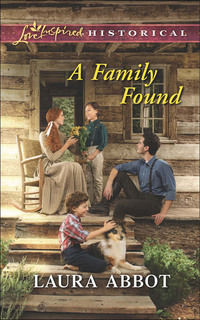
Полная версия
Into the Wilderness
Caleb smiled inwardly. Miss Lily Kellogg seemed to be a woman of myriad and contradictory talents. He didn’t want to be intrigued by her, but even fatigued as he was, the prospect of learning more about her kept him alert. A half hour later, after further conversation and two pleasing piano pieces, the major asked him to escort the Kellogg sisters home.
Outside, clouds played tag with a nearly full moon. The light-colored stones of the buildings shifted and glowed as shadows came and went. From the enlisted men’s barracks came sounds of revelry. It was nearly time for taps, so as they proceeded across the parade ground, the noises gradually subsided. At the door of the small house adjoining the hospital, Caleb took each of the ladies’ hands by turn. “Miss Rose, Miss Lily. Good night.” His gaze caught Lily’s. “Thank you for an evening I will long remember.”
“Good night, Captain,” the women said in unison before disappearing inside.
Caleb strolled back across the parade ground, reaching his quarters just as the bugler sounded taps. As they often did, the haunting notes recalled other nights, other encampments. Deeply moved, he lingered on the porch, taking in the fort, the surrounding countryside, the limitless sky. Feelings he hadn’t experienced in a long time, if ever, came over him. Part longing, part mystery, part promise—all centered in the disturbing sense that it wasn’t by accident God had put Lily Kellogg in his path.
Sighing wearily, he regained control of his thoughts. He would need to be on his guard. A woman had hurt him once, and he never wanted to feel that vulnerable again. No matter the provocation.
Chapter Two
Sunlight filtering through the windows of the post hospital the next morning brought an illusion of cheer to the convalescing patients. Lily moved among the beds, changing a bandage here and wiping a fevered brow there. Only after she had checked all the patients did she pause at the bedside of a young man who had been kicked by a horse, suffering painful bruises and a concussion. Taking his hand, she gently called his name.
The man stirred, then groaned. Lily spoke louder. “Benjamin, tell me where you are.”
His eyes fluttered before focusing on her. “In heaven?”
“Try again. Where are you?”
The hint of a smile teased his lips. “Just joshin,’ Miss Lily. Hospital. I’m in the hospital.” Then just before he fell back to sleep, he mumbled, “Clumsy nag of a horse.”
Across the room lay a cook, scalded by a pot of boiling soup, his hands mittened in gauze. She made her way to him. “I have time now, Timothy, to write that letter for you.”
She retrieved paper, pen and the lap board and listened as he dictated his message. “Tell me mum I am dandy. Say I had a bit of an accident, but that I’ll be cooking again before she even gets this letter. Ask her to write.”
Lily had seen the burns on his hands and doubted he’d be cooking anytime soon. She prayed he would be spared infection, so common with burns. “I will post your letter this afternoon.”
“Thank you, miss,” he whispered, tears flooding his eyes. She turned away to spare him embarrassment.
When she had finished her duties, she stepped into the small surgeon’s office where her father was working on his weekly medical report. “Do you need me further, Papa?”
Ezra Kellogg looked up, his blue eyes gentle behind his spectacles. “You’re a godsend, daughter, but we’ll manage for the rest of the day.”
Lily studied his pale face and stooped shoulders. There was an air of resignation or...a lack of vigor...something that had diminished him. It was as if when his wife’s life drained away, his spirit had ebbed, as well. She and Rose did what they could to lighten his heart, but, in truth, all of them sorely missed Mathilda. Only after her death had Lily realized the extent to which her mother had been the family’s anchor.
Not quite six years before, a similar shadow had passed over the family and forever changed them. During the war she, Rose and her mother had prayed unceasingly for the safety of her father and brother, David. Lily’s chest tightened, as if a claw gripped her heart. David. So amiable and strong. It had been natural to idolize the big brother whose hearty laugh had charmed them all. In her innocence, she had thought him invincible. Until that awful news. The telegram from the War Department had stated in cold, impersonal terms that their beloved David had been killed in the Battle of Lookout Mountain.
She remembered the sickening feeling she’d experienced with the realization that he had been dead for many days before they received word. Days when he had still lived in her imagination—eating, laughing, singing and...fighting. That blow had been especially cruel since they had no efficient way to communicate with Ezra. Their father’s return following the war, though a cause for celebration, was a somber occasion, the four of them grieving for the son and brother who would never again grace their family circle. Recalling past family dinners where there was always one empty place at the table, she was reminded of last night’s meal.
“Papa, we missed you at the Hurlburts’ dinner.”
“I hope you and Rose enjoyed it.”
“We did. The new captain dined with us.”
“What did you make of him?”
“He seemed pleasant enough.”
Her father rose to his feet and laid a hand on her shoulder. “I worry about you girls being in this place. There are good men here, but others...” He grimaced. “Others you shouldn’t even have to see, much less come into contact with.”
“Captain Montgomery is no cause for alarm.”
He kissed her forehead. “I probably shouldn’t have brought you here with me, but we had been so long apart during the conflict that I—” his voice cracked “—needed you.”
“And we needed you, do need you.” She patted his arm. “Never blame yourself for our circumstances. Rose and I are fine, and, after all, we are a military family. Women do their duty, too, you know.” Then, to emphasize her point, she saluted airily and took her leave.
As Lily made her customary way from the hospital to the cemetery, the breeze carried a tantalizing hint of spring. Full sun warmed her back as she stood before her mother’s grave, pondering the exchange she’d had with her father. Finally she spoke. “Mama, we miss you so. Papa is lost without you.” She closed her eyes, picturing her parents embracing. “How he must have loved you. And you? How sad to die in a harsh place like this so far from the home you loved.”
Turning to leave, she glanced in the direction where yesterday she’d seen the new cavalry troops arrive, led by Caleb Montgomery. He had none of the arrogance of George Custer, who had been stationed at Fort Larned a few months ago, nor the affected dandyism of some of the others. Montgomery seemed...was solid the word for which she searched? Yes, that, but more. Dependable? Trustworthy?
She chided herself for attempting to pigeonhole the dashing captain. His essence would not be captured, even as she ruefully admitted thoughts of him had captured her, despite her best efforts to will them away.
* * *
Although it had been a week since his arrival at Fort Larned, Caleb had slept poorly, troubled by disturbing dreams. Awake before reveille, he dressed quickly and stepped onto the front porch to watch the sunrise. Smoke rose from the mess hall kitchen, and in the distance a horse whinnied. After a few minutes, he made out the form of the bugler, who sounded notes that brought the fort from quiet to bustling activity. Lantern light flared in the barracks, and he heard the raucous shouts of prompt risers rousing the slugabeds.
From inside, the lieutenant with whom he shared quarters grunted and coughed. Will Creekmore, a fellow from Wisconsin, began every day with prayer. While Caleb found the practice laudable, he wondered how it had served the man on the battlefield. He himself had struggled to find God in the chaos of armed conflict, finally latching onto the instinct for sacrifice, even love, that he observed in the way men in extremity cared for their brothers in arms. He had concluded that just as evil existed and tempted men to war, so was mercy present in the myriad selfless acts he’d witnessed. That thought was all that made his duties bearable. Yet his uneasy truce with God had suffered a significant setback at the Washita River.
He would go to his grave with the horrors of November 27, 1868. On that wintry dawn, he had led his troop to a rendezvous point above the Washita River where they waited in hushed darkness for Lt. Col. George Custer’s command to attack the camp of Chief Black Kettle and roughly two-hundred-fifty vulnerable Cheyenne. A survivor of the infamous 1864 Sand Creek Massacre, Black Kettle had negotiated for peace, but had been unable to control younger, more belligerent warriors, engaging in raids against white settlers.
Swallowing sourly with the memory, Caleb saw it once again in his mind’s eye. Their orders were to take woman and children hostage, but to kill anyone who fired on them and destroy the enemy’s horses. When the first rays of the sun illumined the horizon, the command came, bugles blew and the cavalry charged down on the sleeping village. It took only one shot from a single hapless Cheyenne to incite a frenzy of fighting. Screaming women clutching their children ran for the river, old people fell in their tracks, and bodies littered the snow.
In his nightmares he would forever see the little girl holding a cornhusk doll, a bullet hole through her chest and the lifeless body of a woman cradling beneath her a piteously mewling infant.
He had experienced horrific combat in the War between the States; however, that cause was justified and didn’t involve women and children on the battlefield. But the engagement on the Washita? That was different. It was a massacre. To his eternal shame, he had been unable to prevent it. No wonder he had lost his zest for soldiering. It was even difficult to believe himself worthy as a man.
The orange ball of the sun brought light into his dark thoughts. “God,” he whispered, “help me to understand. Why? Why?” Scraping a hand across his beard, he paused as if waiting for an answer, and then went back into his quarters to shave.
After breakfast, Major Hurlburt gathered the officers for a briefing. Spring wagon trains setting out for Santa Fe would soon be passing their way along with the usual supply wagons. Roving bands of Kiowas, Pawnees and Arapahos, angered by the white man’s usurpation of their tribal lands and hungry after a long winter of deprivation, were on the prowl. Scouts had already located Kiowas camped along the Pawnee Fork. Caleb and his sergeant were ordered to accompany a seasoned troop the following day to deal with the situation and familiarize themselves with the immediate territory.
That evening, keyed up in anticipation of action, Caleb sought the quiet of the post library. Before the war, he had entertained thoughts of studying at university, but now that was a distant dream. However, he reckoned the lack of formal education needn’t keep him from learning.
In a somber mood, he pulled a volume of Tennyson’s poems from the shelves. The book fell open to “The Charge of the Light Brigade,” and Caleb was transported instantly to the suicidal attack in the Crimean War. “Into the valley of Death / Rode the six hundred.” He looked up from the page, grimacing at the image of men riding to certain doom. Did mankind ever learn? Such atrocities were no different from what his own army had inflicted on the peace-seeking Indians massacred at Sand Creek and the shameful Battle of the Washita.
He closed the book, rubbing his eyes, gritty with the need for sleep. Crimea. Unwittingly, Florence Nightingale came to mind, her lantern bringing hope to the wounded and dying there. How incongruous that the lovely Lily Kellogg could also be engaged in such grisly hospital work. Yet her name had surfaced again and again in the conversations of men at Fort Larned. Although she brooked no nonsense, they said, she had a fearless and compassionate heart, and sometimes their healing had depended as much on that as on any medicines or procedures.
As if he had conjured her, the door opened and Lily entered, her attention fixed on the stack of books she carried. When she saw him, she uttered a startled “Oh” and dropped her armload on the floor. He hastened to her side, where they both knelt to gather the volumes.
“I didn’t mean to alarm you,” he assured her.
At that same moment she was saying, “I wasn’t looking where I was going.”
In the lantern light, her hair cast a golden glow, and he found himself at a loss for words, finally managing, “Do you come here often?”
“It’s my favorite place,” she murmured.
He assisted her to her feet and then gathered the books and laid them on a shelf. “Mine, too. No matter the post to which I’m assigned.”
Looking over his shoulder, she noted his book, abandoned on the chair. “What were you reading when I disturbed you?”
“First of all, you didn’t disturb me. Besides, Tennyson’s ‘The Charge of the Light Brigade’ is rather gloomy. In truth, I was daydreaming rather than reading.”
She crossed the room, picked up the poetry collection and skimmed it. “I do so admire his work. ‘Flower in the Crannied Wall’ is one of my favorites.” She closed her eyes and recited, “‘Little flower—but if I could understand / What you are, root and all, and all in all, / I should know what God and man is.’”
“A big if. Can we ever know about God and man? Would we even want to? Man has a habit of mucking up things.”
She smiled, a glint of humor in her eyes. “Not only ‘man.’ In rare instances, ‘woman’ can also create problems.”
Rather than going to the unhappy place where a woman had created a problem for him, he chose to respond to her lightheartedness. “In rare instances? My dear miss, have you forgotten Eve?”
She laughed, a delightfully musical sound. “I fear, sir, that any discussion of serpents and apples might take an unpleasant turn.”
“Perhaps, instead, we should both pledge to reread Milton’s Paradise Lost and compare our reactions later.”
“He is a marvelous poet, isn’t he? Such descriptions of the Garden of Eden. Why, I myself might have bitten into the forbidden fruit.”
He had a sudden image of her rosy lips grazing a red-ripe apple. He mentally erased the charming picture. “Did you come for a particular title?”
She moved to the bookshelf, where she hesitated. “No, I’m browsing.” She laughed again. “That’s not exactly true. I’ve read nearly everything here.”
“Then I shall look forward to hearing your recommendations.” He was pleasantly surprised. From his brief exposure to her at the Hurlburts’, he hadn’t figured her for a bookworm. Discussing literature with her would provide at least one antidote for the boredom that was part of military life.
“I favor Mr. Dickens and the Romantic poets,” she said.
“My, quite a divergence of taste.”
“And why not? Fiction, poetry, biography, essays—we don’t have sufficient time to read everything, but I try.”
He inclined his head in an abbreviated bow. “Permit me, then, to take my leave so you may find the hidden gem that you have not read.”
She bestowed a smile that banished any thought of the Crimea. “Good night, Captain.”
“Good night, Miss Kellogg.” Then as an afterthought, he added, “I shall look forward to sharing our opinions concerning Paradise Lost.”
“As shall I,” she said.
Walking toward the officers’ quarters, Caleb pondered the if in Tennyson’s poem. To understand God and man. He longed to understand God, to find answers to his questions. As for “man,” they were a mixed lot. As he had to admit women were, too. Even on short acquaintance it was clear that Lily bore no resemblance to Rebecca, the faithless woman who had broken his heart.
* * *
“In like a lion, out like a lamb,” Rose announced on the last day of March as she and Lily made their way to the sutler’s to buy provisions and collect the mail.
The day was warm, and wagon wheels and horses’ hooves had churned the ground into dust that clung to their boots and the hems of their dresses.
“We’d best enjoy days like this,” Lily observed. “Remember last summer? I swear equatorial Africa couldn’t be any hotter. In mid-July, we will look back on this weather with gratitude.”
Rose linked her arm with Lily’s. “Enjoy the day, this day. God’s day.”
Lily squeezed Rose’s hand. Their mother had often uttered those very words when her impatient daughters peppered her with questions: “When is Papa coming home from the war?” “How long until my birthday?” And more recently, “How are you feeling this morning, Mama?”
When they entered the store, enlisted men buying tobacco and assorted medicinal items made way for them. Several tipped their caps, a few ventured mumbled hellos and one insolent corporal winked leeringly. Jake Lavery, the proprietor, beamed as they approached. “Ladies, what can I do for you?
After placing their grocery order, Lily ushered her sister to a corner where yard goods and sewing notions were displayed. Thus removed from the prying eyes of men, the sisters studied some newly arrived bolts of cloth.
Rose stroked a brown calico covered with sprigs of tiny yellow flowers. “I rather fancy this for my summer dress.”
Each summer and winter, their father provided them with money to make one serviceable gown apiece. Lily always had difficulty making up her mind, and today was no exception. She draped a navy blue muslin across her shoulders.
Rose shook her head. “Too drab. Try the gingham. It reminds me of the ocean. That is, if I’d ever seen it.”
Lily unrolled a couple of yards and carrying the bolt to the small mirror on the wall, held the gingham to her face. The color did something magical for her eyes, tinting the usual blue with a hint of sea-green. She turned to Rose. “I like it.”
“That was easy. I do, too. Have we need of patterns?”
Lily shook her head. “I have some ideas about adapting ones we already have.”
“I trust you. You’re the expert seamstress.”
Mr. Lavery’s wife measured and cut the material, then wrapped it in brown paper and tied it with string. “Come show me when you’ve finished the gowns.” A wistful expression crossed her leathery face. Observing the woman’s worn gray dress, Lily ached for her. Frippery was hard to come by on the prairie where simplicity and practicality were both necessary and valued.
Lily tucked their purchases in the mesh bag they had brought with them. Their last stop was the mail counter. “Kellogg. Anything for us?” Rose inquired of the red-bearded postal agent, recently arrived at the fort.
“I know who you are,” the man said, as if offended that they would identify themselves to someone with such a brilliant memory. “You’re those girls the men are always talking about.”
Rose bristled. “I hardly think so.”
The man leaned on the counter and folded his gnarled hands, peering at them with beady eyes. “Bet on it, miss. It’s just as well your papa don’t hear some of what they say.”
Lily drew herself up to her full height. “Sir, our mail, if you please.”
He grinned wolfishly, then took his time moving to the mail slots.
“I declare,” Lily whispered to her sister. “The nerve.”
Rose took the letters from the man, uttered a huffy “thank you” and led Lily out of the place.
“That was demeaning,” Lily said when they were out of earshot.
“Yes, but, Lily, I imagine the men do talk of us...you. Think about it. They’re far from home, missing their wives and sweethearts. And some of them are so young. Bachelors.” She trudged on deep in thought, then added, “Don’t you see how they look at you?”
“Me?” Lily blushed.
“Oh, there’s some that might settle for me, but you’re the beauty.”
“Hush, Rose. Don’t you go tempting fate with that talk. ‘Pride goeth before a fall,’ and I don’t want to be prideful.”
“You can’t pretend you don’t notice their interest. For example, that new captain couldn’t keep his eyes off you at the Hurlburts’ dinner.” She stopped in her tracks and studied her sister. “You could do a lot worse,” she said gently.
“I’m not husband hunting.” Lily grinned coquettishly. “At least not until St. Louis, if that time ever comes.”
“St. Louis. A den of iniquity, if you ask me.”
“I didn’t.”
With a shrug, Rose held up the mail. “I suppose then that you’ll be wanting to look over the letter that came today from Aunt Lavinia.”
“Oh, do let’s hurry.” So eager was Lily to read the letter, she didn’t notice how Rose lagged behind. Nor did she see the concern in her sister’s eyes.
At home, scanning Aunt Lavinia’s letter before sharing it with Rose, Lily sighed in disappointment. There was no invitation for either of them. Just a description of Lavinia’s new Easter bonnet, the menu of a sumptuous dinner at the home of a local politician and a recipe for an elegant presentation of tenderloin of pork, as if they often had such a cut of meat available.
Bent over her crocheting, Rose looked up as Lily read the final paragraph.
“I shudder to think of you girls subjected to the cold winds and extreme weather of the prairie. Not to mention living in a forsaken army post, surrounded by who knows what sort of individuals. For the life of me, I cannot understand why Ezra took you to such a place. Would that your mother had persuaded him to abandon his army career. Well, water over the dam. I pray for your safety and hope conditions will permit us once again to meet. Perhaps after the miasma that is summer here along the Mississippi.
Your devoted aunt,
Lavinia”
Lily put the letter aside and sought composure by going to the sewing cabinet to locate the pattern for Rose’s new dress. Only now in light of Lavinia’s vague promise could she admit how much she had counted on deliverance from this wilderness outpost. She tried to take each day as it came, but the fierce, unpredictable spring winds tried her soul and increased her longing to escape. At times she wanted to scream from sheer frustration.
Rose had said something, but lost in her thoughts, Lily had to ask her to repeat it.
“Dear sister, patience.” Rose wasn’t trying to irritate her, and, yes, patience was needed, but right now the advice rankled.
“What’s the matter with me, Rose?”
Her sister set aside her crocheting. “You really do want to leave. It’s more than a dream, isn’t it?”
Lily sank back into her chair. “I’m so restless. Every day is like every other day. Rose, there’s a whole world out there, and I want to be part of it. If only I were a man, I could choose my lot and go wherever my fancy took me.”
“I would miss you.”
Chastened, Lily hung her head. “And I you.” She had thoughtlessly hurt her sister. The tug to home and to Rose and Papa was strong, but so was the pull of the exciting world beyond the prairie. Why couldn’t she lay aside these dreams that only grew more compelling with each passing day?
“Are you very disappointed? Had you thought Aunt Lavinia’s invitation would come this soon?”
Lily looked helplessly at her sister, unable to confess the degree to which she had counted on Aunt Lavinia to save her. “Mama wouldn’t like me to act like this. She would say everything happens in God’s time, not mine.”
Rose nodded as if her suspicions were confirmed. “Then leave it to God.” She began crocheting again. “Meanwhile, I so love having you here for company. And take heart. Aunt Lavinia didn’t rule out a visit later in the year.”
Lily unfolded the pattern, but, disappointed by the letter and consumed by guilt over how her departure would affect Rose, she couldn’t concentrate on dressmaking.
* * *
Several nights later, Caleb stretched out by the campfire, wearily resting his head on his saddle. This morning the cavalry had caught up with a band of Kiowas secluded in a small grove of trees. The soldiers had mounted a charge. Outmanned, the Indians had fired a few warning shots and then, to Caleb’s relief, had fled on horseback. Since the Washita, he had no stomach for engagement.







